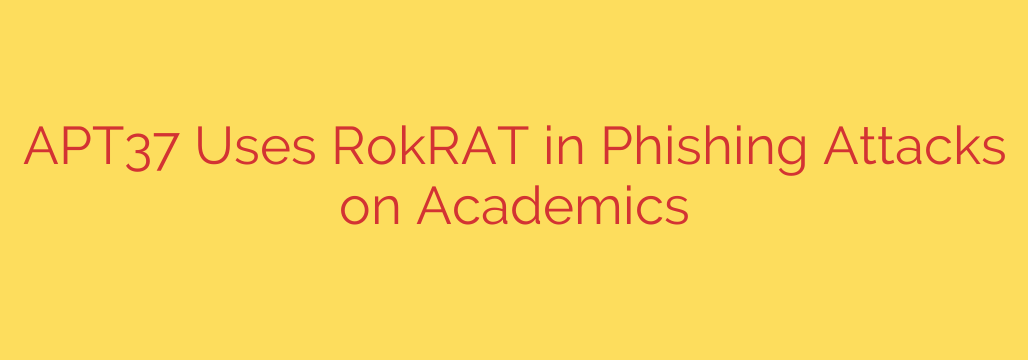
Warning for Academics: North Korean Hackers Deploy RokRAT Malware in Targeted Phishing Attacks
A sophisticated cyber-espionage group with ties to North Korea is actively targeting academics and researchers with a potent malware known as RokRAT. This campaign leverages highly convincing phishing emails to breach networks, steal sensitive data, and conduct long-term surveillance on experts in international relations and political science.
The threat actor, tracked by cybersecurity experts as APT37 (also known as Reaper or ScarCruft), has a long history of conducting intelligence-gathering operations aligned with North Korean state interests. This latest campaign demonstrates a continued focus on the academic sector, which is often perceived as a soft target rich with valuable information.
The Attack Method: Deceptive Spear-Phishing
The primary method of attack is spear-phishing, a type of targeted email attack that is far more personalized and deceptive than a standard phishing blast. These are not generic emails; they are carefully crafted to appear legitimate and relevant to the recipient’s work.
Here’s how the attack typically unfolds:
- Lures and Pretexts: The attackers send emails that appear to be from colleagues, conference organizers, or journalists. The subject matter is often related to academic papers, event invitations, or requests for expert commentary on geopolitical issues, particularly those concerning North Korea.
- Malicious Attachments: The emails contain a malicious attachment, often disguised as a document like a PDF, Word file, or a compressed ZIP archive. In many recent incidents, these attachments are malicious LNK or CHM (Compiled HTML Help) files.
- Initial Infection: When an unsuspecting victim opens the attachment, it triggers a multi-stage infection process that quietly downloads and installs the RokRAT malware onto their system without their knowledge.
Understanding RokRAT: A Stealthy Espionage Tool
RokRAT is a powerful and stealthy Remote Access Trojan (RAT) designed specifically for espionage. Once installed on a victim’s computer, it provides the attackers with complete control and unfettered access to sensitive information.
The primary capabilities of RokRAT include:
- Keystroke Logging: Capturing everything the user types, including passwords, private messages, and draft documents.
- File Theft: Searching for and exfiltrating specific files based on keywords or file types. This could include research data, grant proposals, and confidential correspondence.
- Screenshot and Audio Capture: Periodically taking screenshots of the user’s screen and recording audio through the device’s microphone.
- Data Exfiltration via Cloud Services: One of RokRAT’s most effective features is its use of legitimate cloud services (such as pCloud, Dropbox, or Yandex Cloud) for its command-and-control (C2) communications. By using these common platforms, the malware’s traffic blends in with normal network activity, making it much harder for security tools to detect.
This ability to hide in plain sight allows APT37 to maintain a persistent presence on a compromised network for months or even years, continuously siphoning valuable intelligence.
Why Target Academia?
Universities, think tanks, and research institutions are high-value targets for nation-state hackers. These organizations hold a wealth of information that is crucial for foreign intelligence, including:
- Sensitive Research: Unpublished studies on defense technology, foreign policy, and economic forecasts.
- Government Contacts: Academics often consult for government agencies and have extensive networks of influential contacts.
- Insider Information: Access to pre-publication policy papers and strategic discussions that can provide insight into a nation’s future plans.
By compromising the accounts and devices of prominent academics, groups like APT37 gain a strategic advantage, accessing a stream of intelligence that would otherwise be difficult to obtain.
Actionable Security Tips to Stay Protected
Given the targeted nature of these attacks, individuals and institutions in the academic sector must adopt a heightened security posture. Standard security measures are a good start, but vigilance is key.
Treat All Unsolicited Emails with Suspicion: Be wary of unexpected emails, even if they seem to come from a known person or organization. Verify the sender’s identity through a separate communication channel (like a phone call) before opening attachments or clicking links.
Scrutinize File Attachments: Never open unusual file types, especially
.lnk,.chm, or files that prompt you to “enable content” or “run macros.” Configure your operating system to show full file extensions to help spot deceptive files likedocument.pdf.lnk.Implement Multi-Factor Authentication (MFA): MFA is one of the most effective defenses against account compromise. Even if an attacker steals your password through keylogging, MFA will prevent them from accessing your email, cloud storage, and other critical accounts.
Keep Software Updated: Ensure your operating system, web browser, and all applications are regularly updated. Software patches often fix security vulnerabilities that malware exploits for initial access.
Utilize a Reputable Endpoint Security Solution: Modern antivirus and endpoint detection and response (EDR) solutions can help detect and block the execution of malicious files and monitor for suspicious network activity characteristic of RATs like RokRAT.
Staying informed about the tactics used by threat actors like APT37 is the first step toward building a strong defense. By combining technical safeguards with a culture of security awareness, academic professionals can significantly reduce their risk of falling victim to these targeted espionage campaigns.
Source: https://securityaffairs.com/181782/apt/north-koreas-apt37-deploys-rokrat-in-new-phishing-campaign-against-academics.html








